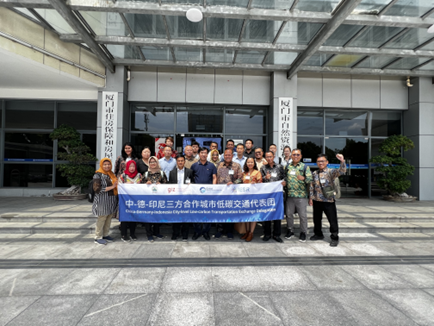On 15 November 2023, the Urban-Act project China component and its regional consortium partner United Cities and Local Governments Asia-Pacific (UCLG ASPAC) organised a learning forum titled “City Enabling Environment Assessment on Environmental and Climate Change Governance”. The event took place in conjunction with the 9th UCLG ASPAC Congress in Yiwu, Zhejiang, and gathered about 40 representatives and practitioners from city governments and institutes in China, Thailand, India, Indonesia, the Philippines, Nepal, and other countries.

The 9th UCLG ASPAC Congress is a highly anticipated gathering of local government leaders, urban practitioners, and stakeholders from the Asia-Pacific region. Intending to foster dialogue, knowledge exchange, and collaboration, this congress provides a platform to address pressing urban challenges and explore innovative solutions for sustainable urban development. Against this backdrop, the learning forum, held as a side event during the congress, was designed to highlight two vital aspects of the Urban-Act project: the delivery of the results of the 2023 assessment of city enabling environments regarding environmental and climate change governance (CEE-ECG) and a panel session showcasing the experience of pilot cities in addressing respective challenges and sharing solutions in climate change.
Mr Martin Hofmann welcomed the audience in the room through a video message on behalf of GIZ East Asia. In the video, he provided a brief introduction of the Urban-Act project and his opinions concerning the enabling environment for sustainable urban development in Urban-Act’s context.

Subsequently, the findings of the CEE-ECG 2023 assessment were unveiled and discussed. This comprehensive assessment aims to evaluate the institutional environment of local governments in the context of environmental and climate change governance. When delivering the assessment results, Dr Mizan Bisri from Kobe University provided an overview of the enabling environment for sustainable urban development in China, the Philippines, Thailand, Indian and Indonesia, based on CEE scoring. He also highlighted areas for improvement and further policy actions, focusing on best practices to promote CEE-ECG in project partner countries. Representing the National Center for Climate Change Strategy and International Cooperation, Mr ZHOU Zeyu shared insights into the results of the CEE-ECG for China, also addressing China’s overarching policy framework and local practices.
In a panel discussion of best practices of cities in the Asia-Pacific region, speakers shared practices from Urban-Act project pilot cities. The panel session showcased the cities’ transformative journey towards sustainable urban development, emphasising challenges and lessons learned according to the CEE-ECG sub-criteria. Representing the city of Xiamen, Mr SHI Zhifa presented the strategies for developing climate-friendly transportation in Xiamen as well as project cases on improving the mobility system, green freight system, and near-zero emission pilots. Mr YANG Neng from CIB Research Carbon Finance Institute introduced financing opportunities in China’s green transition. In addition, governors, and experts from other partner countries of the Urban-Act project presented their experiences on climate actions.

Dr Bernadia Irawati Tjandradewi, Secretary General of UCLG ASPAC, wrapped up the forum and emphasised the valuable results of the CEE-ECG 2023 assessment. The study provided the participants with a comprehensive understanding of the current enabling environments in cities across the Aisa-Pacific region. This fosters a deeper appreciation of the factors influencing urban development, including policies, laws, institutions, governance systems, and their implications for climate change resilience and sustainable development.

In conclusion, the learning forum, featuring various cities’ experiences in implementing the Urban-Act project, has equipped the audience with practical knowledge and innovative approaches to address urban challenges and improve their governance structures. In particular, the forum strengthened China’s role as a knowledge partner disseminating best practices and connecting Chinese with international experts and stakeholders in the Asia-Pacific region. Numerous questions to the Chinese experts present at the forum reflect the great interest in China’s experiences and solutions for developing low-carbon and climate-resilient cities.



